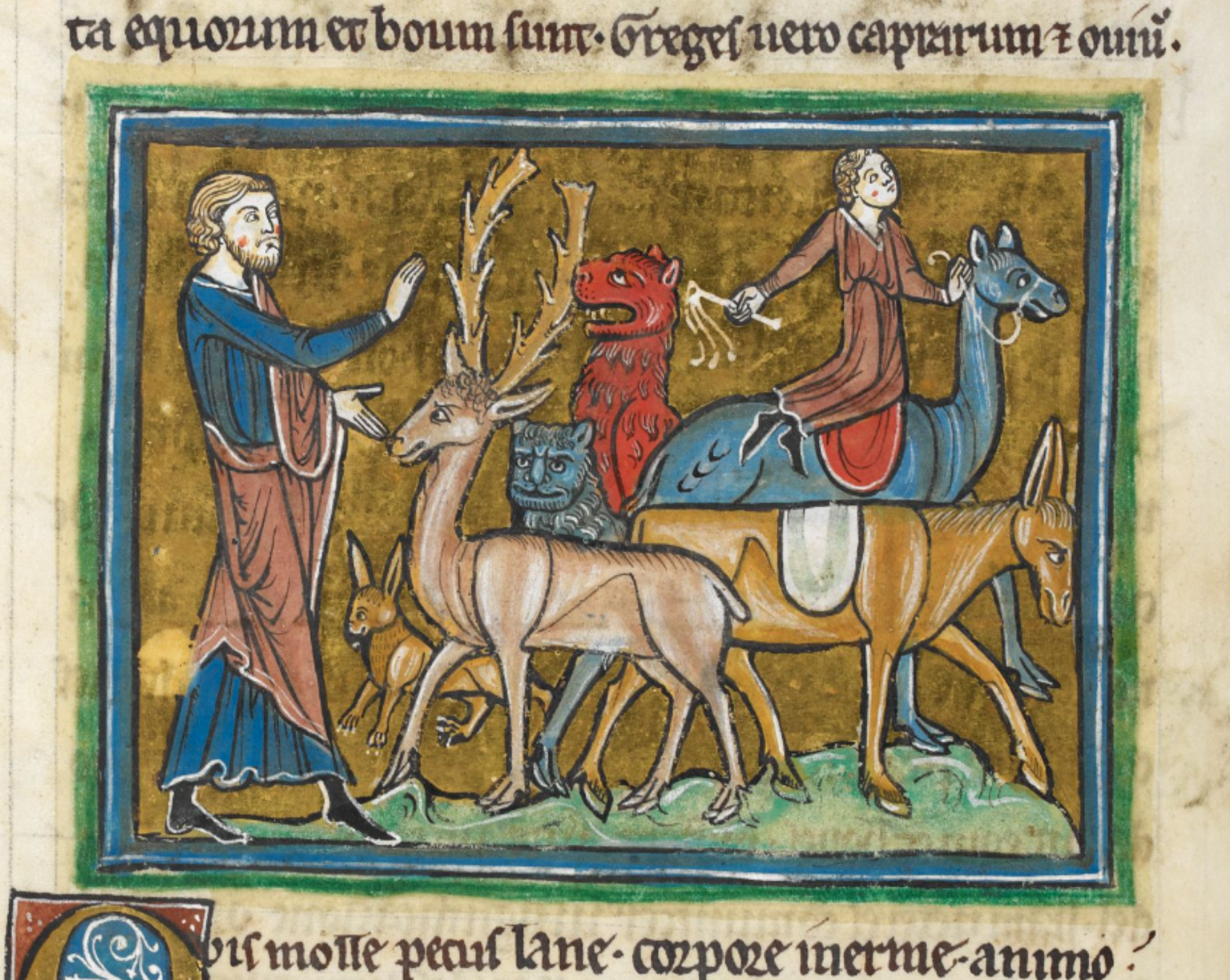On Adam naming animals, Rochester Bestiary, c.1230
This passage explores the nuanced categorization of animals based on their traits, functions, and relationships with humans, reflecting both practical considerations and philosophical insights.
Adam, in a symbolic act of understanding and respect for the essence of all living beings, assigned names to them according to their inherent qualities. He chose Hebrew, the language common to humanity before the flood, as the medium for this task. Unlike later nations who named animals in their own languages, Adam's naming process transcended linguistic barriers.
In Latin, animals are categorized based on their characteristics and utility. Animalĭa denotes creatures animated by life and spirit, whereas the word quadrupeds describes those moving on four legs. However, distinctions arise between livestock and beasts of burden such as lions or animals used for labour.
Pĕcŭs encompasses non-humanoid creatures, with pecora referring to animals suitable for consumption or human activities, such as sheep, pigs, horses, and oxen. Pecudes specifically denotes grazers led to pasture, while iumenta emphasizes animals aiding human labour, such as oxen, horses, and donkeys, due to their strength and utility.
Similarly, armenta denotes animals used in battle or those embraced as friends, including oxen and horses. The term contrasts with greges, which specifically refers to flocks of goats and sheep.
Appellans unicuique nomen ex presenti institutione.
iuxta conditionem nature. Gentes autem unicuique anima-
lium ex propria lingua dederunt vocabula. Non autem secundum
latinam linguam aut grecam aut quarumlibet gentium
barbararum nomina illa inposuit adam. set illa lingua
que una ante diluvium fuit omnium. que hebrea nuncupatur.
Latine autem animalia sive animantia dicta; quod ani-
mentur vita; et moventur spiritu. Quadrupedia vocata;
quia quatuor gradiuntur pedibus. que dum similia
sunt pecoribus; tamen sub cura humana non sunt. Ut cervi.
damme. Onagri et cetera. Sed neque bestie sunt. ut leones.
neque iumenta. ut usus hominum iuvare possint. Pe-
cus dicimus omne quod humana et effigie caret. Proprie(corrected from Propriie) autem
nomen hiis animalibus accommodari solet que sunt ad ves-
cendum apta. ut oves et sues. au in usu hominum commo-
da. ut equi et boves. Differt autem inter peccora et pecu-
des. Nam veteres communiter in significatione omnium
animalia pecora dixerunt. Pecudes autem tantum illa
animalia que edunt quasi pedes. Generaliter autem omne
pecus a pascendo vocatum. Iumenta inde nomina traxe-
runt quod nostrum laborem vel onus suo adiutorio(corrected from adiutoreio)
sub vehendo vel arando iuvent. Nam bos carpenta
trahit. et durissimas terre glebas vomere vertit. Equs
et asinus onera portant. et hominum laborem gradiendo;
homines. Sunt enim magnarum virium animalia. Item quoque
armenta. vel quod sint armis(dots underneath) armis apta. idest bello;
vel quod hiis in armis utimur. Alii armenta tantum bo-
ves intelligunt. ab arando. vel quod sint cornibus arma-
ta. Discretio autem est inter armenta et greges. Nam armen-
ta equorum et boum sunt. Greges vero caprarum et ovium.
Therefore, these animals are called iumenta, for they help humans. Indeed, they are animals that possess great strength. Similarly, the animals we call armenta2 include those armed for battles and that we take to war or those we are friends with and that we embrace. Other armenta refer only to oxen suitable for ploughing or bulls having horns. The difference between armenta and greges3 lies in the fact that armenta include horses and oxen, while greges refer to flocks of goats and sheep.
Bibliography
Josh Goldenberg (BA 2012) and Matt Shanahan (BA 2014), Logeion, November 2022, https://logeion.uchicago.edu/
Castiglioni, L. and Mariotti, S. (1996). Vocabolario della Lingua Latina: Latino-Italiano Italiano-Latino. Terza Edizione. Loescher Torino
Footnotes
1 Both pecora and pecudes come from pĕcŭs: the former is a feminine noun and the latter a neuter noun. The latter refers to all animals in general whereas the latter can also refer to sheep.
2 Armenta in the plural form means also domestic animals, namely pets.
3 Greges is the plural form of grex, meaning flock/herd.

